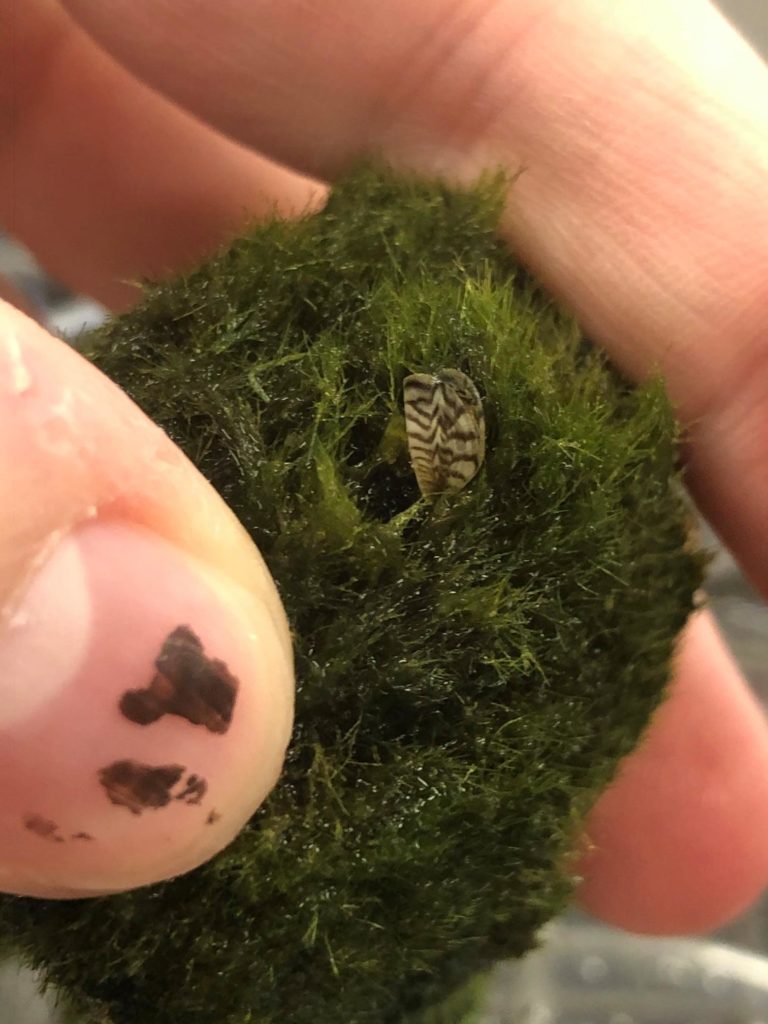
[lastupdated] EST
A surprising social media post from the Coast Fork Willamette Watershed Council is cause for concern, as it appears that stopping the spread of the invasive zebra mussel, Dreissena polymorpha, may no longer just be a concern for boaters and fishermen.
The culprit? Marimo moss balls, which are in actuality one of three growth forms for the green algae known to science as Aegagropila linnaei. Popular in the pet trade, it appears that they could now be carrying the sinister hitchhiker. Social media commentary initially suggested that at least one pet retailer is now withholding the sale of marimo balls as a result of these discoveries.
It has since been confirmed by an Aquatics Specialist working with Petco that an action memo was distributed internally to stores on the evening of March 4th instructing employees to remove marimo moss balls from the shelves. Updates on March 5th from news outlets now confirm contaminated moss balls at both Petco and Petsmart locations. At least one other online aquarium retailer has been implicated by public comment on social media, and the latest update from PIJAC suggests that this is going to be a nationwide problem, at least right now.
While news only reached social media only in March, the first discovery appears to have actually occurred on February 9th, 2021, at a pet shop in Seattle based on the date stamp of the USGS report. Putting the puzzle pieces together, information from the Michigan Department of Natural Resources suggests that that only once the initial report was confirmed was an alert issued by the USGS to state DNRs. Once the alert was raised and people started looking, many more contaminated marimo moss balls were discovered on the shelves at pet stores around the United States.
Subsequently, Zebra Mussels had been discovered in marimo moss balls at another pet shop in Salem, Oregon. Then, a slew of updates on Friday, March 5th. which added stores in Florida, Montana, Colorado, North Carolina, and South Carolina finding contaminated moss balls on their shelves. Additional research late in the evening has uncovered confirmed findings in Georgia, Idaho, Wyoming, and Virginia. Saturday news reported confirmed findings in Pennsylvania.
At the moment, there are confirmed discoveries of zebra mussel-infested marimo moss balls in 12 states. There are likely many unknown instances at this time.
The US Fish and Wildlife Service has set up a webpage in response to this problem. Their mandate is strict—Destroy, Don’t Dump!
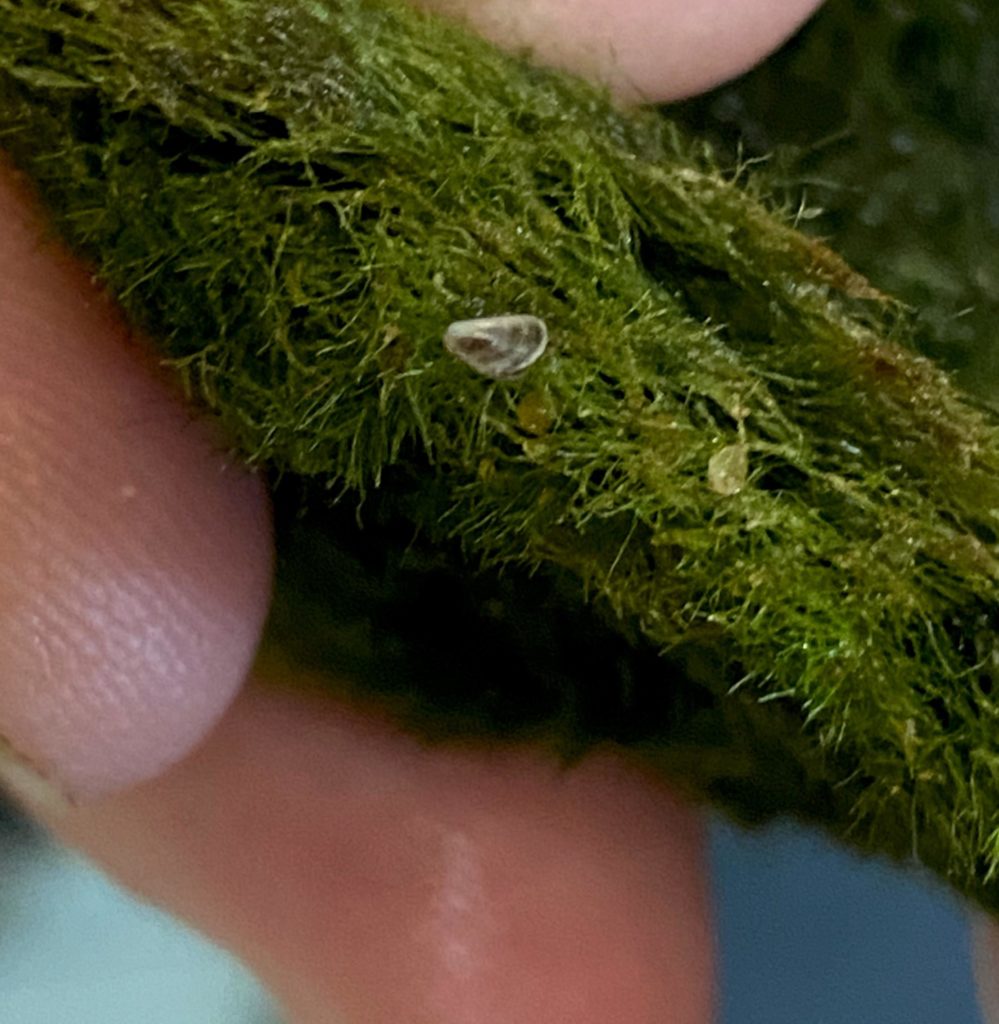
Where We First Learned Of The Problem
via Coast Fork Willamette Watershed Council
There has been a troubling sighting report from Seattle. A pet store employee has been finding zebra mussels attached and inside moss balls sold as aquarium plants.
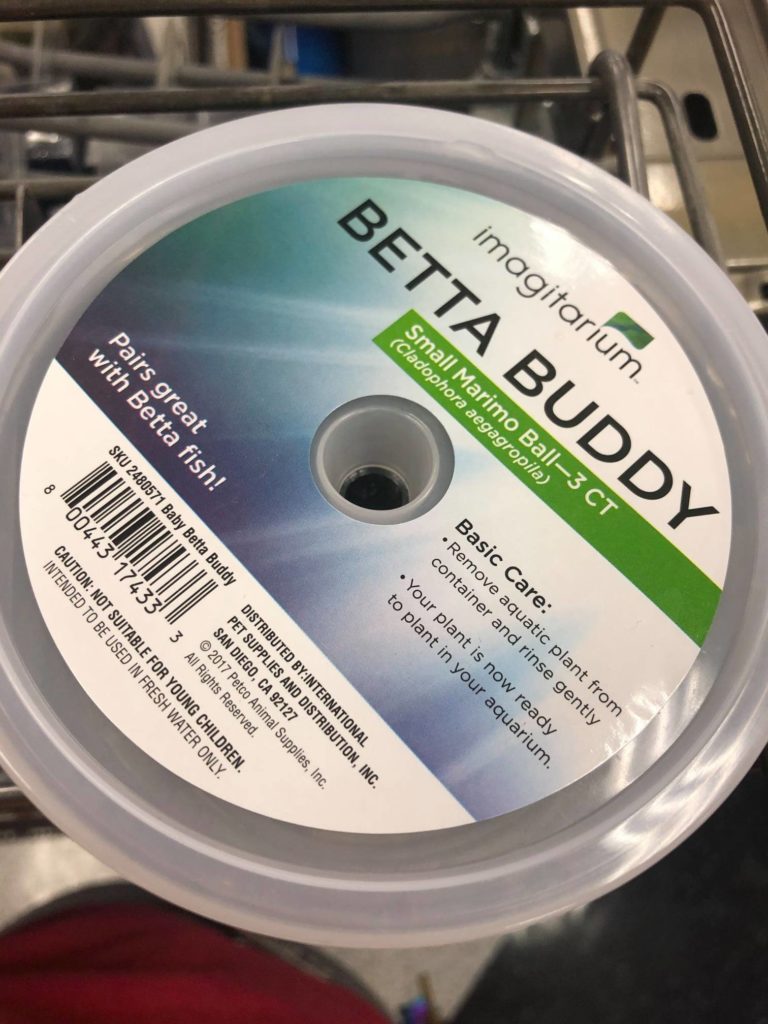
The significant danger is these moss balls are being distributed across the U.S. We are asking that you please check out your local pet stores here in Oregon to see if they are selling “Betta Buddy” brand moss balls.
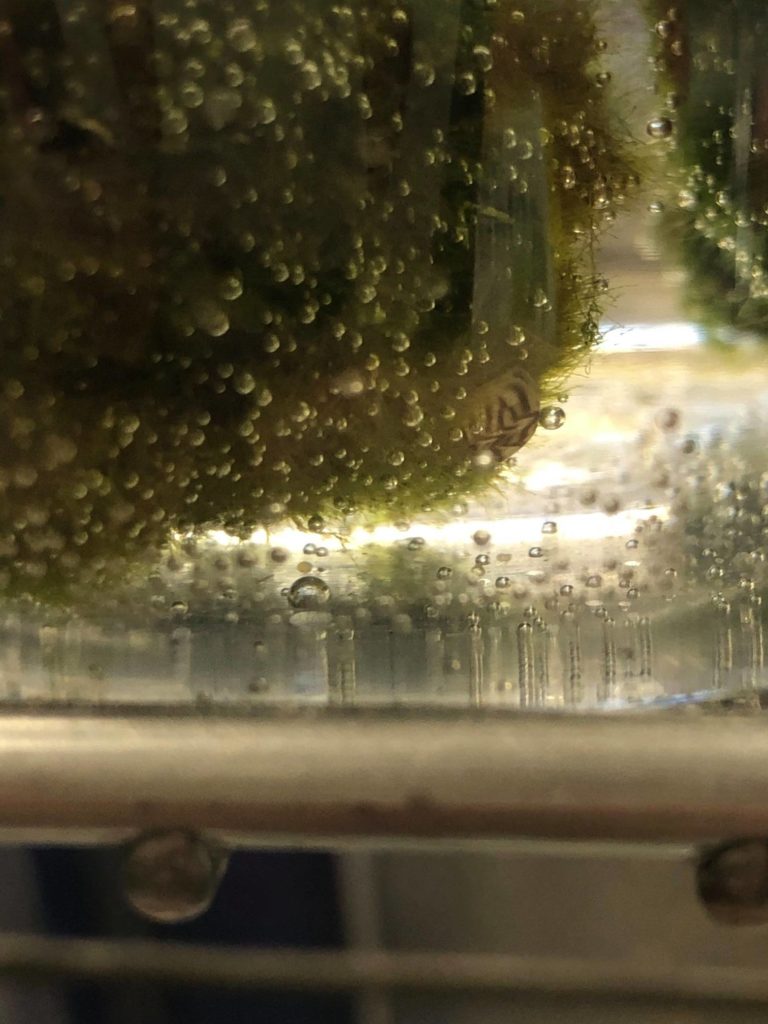
[Oregon Residents:] Please contact Rick Boatner immediately (503-947-6308; Rick.J.Boatner@state.or.us) if you find any.
###
Updates on Friday, March 5th
Florida-based WaterScapes Aquatic Plant Nursery shared interesting insights into this issue with their customers via email newsletter. WaterScapes is taking a proactive step to suspend their sales of marimo moss balls. The editors wish to note at this time that we are unaware of any linkage between the zebra mussels discovered, and WaterScapes Aquatic Plant Nursery.
“We were just made aware that there were zebra mussels found on moss balls in various retail stores in several states. We were informed that zebra mussels can only survive out of water for 30 days. We keep our moss balls in a 42 degree cooler and they are there for several months at a time, so if zebra mussels are found in our moss balls they are most likely dead. However, we are going to err on the side of caution and suspend moss balls sales until the situation can be assessed further. We are actively working with local and national scientists to find a solution and will keep you updated as we find out more.”
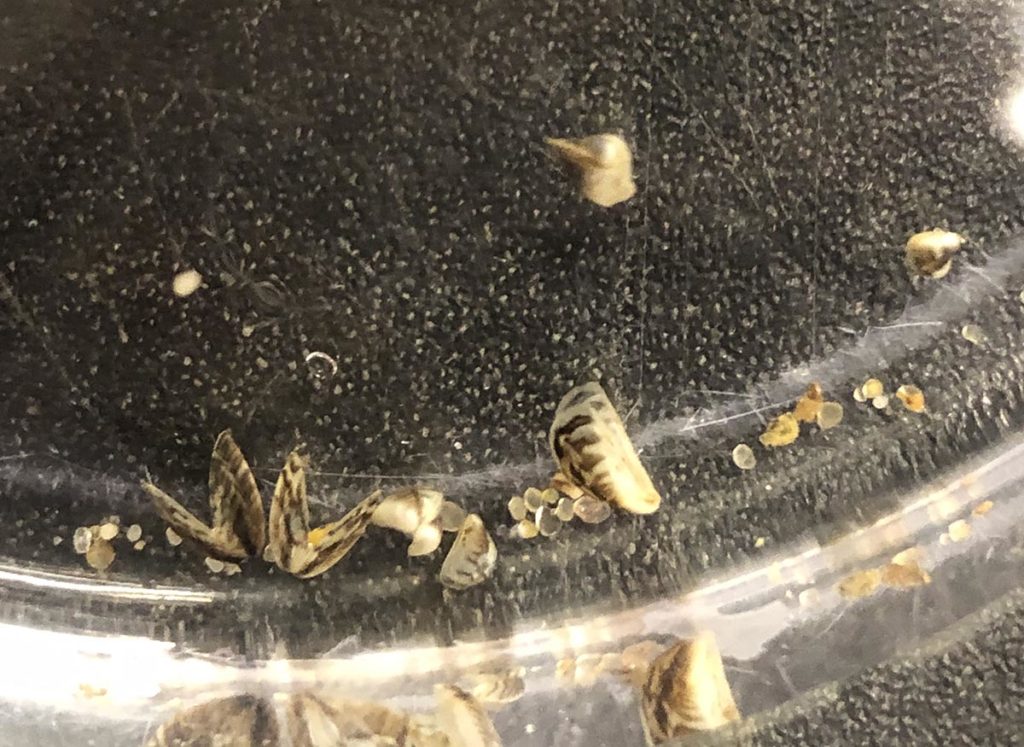
In addition, PIJAC issued an Invasive Species Alert on Friday, which further documents this developing story and includes detailed instructions on how to handle contaminated moss balls.
What To Do?
Depending on where you live, it can be illegal to possess or transport invasive species like the zebra mussel. Disposal of water that could contain zebra mussels or their larvae could be similarly problematic.
Based on the timing of the first reported contamination, anyone who has purchased marimo moss balls in the last couple of months, particularly of the Betta Buddy brand, should contact the local fish shop or vendor where they purchased it to see if they have any news, recalls, or special instructions.
It is also our suggestion that if you’ve recently purchased any marimo moss balls, give them a once over for zebra mussels. If you find any, contact your local department of natural resources for further help and instructions.
Per KTVZ reporting, the Oregon Department of Fish and Wildlife is recommending the following course of action.
“Consumers are also urged to stop buying this product and to safely dispose of it by either freezing or boiling the moss ball before disposing of it in the trash (do not flush down toilet or throw outside as mulch).
“For your aquarium, after removing the fish, apply household bleach (one cup of bleach per gallon of water) and let it set for 10 minutes before disposing of water down sink or toilet. Also disinfect filters, gravel, and structures with a solution of bleach before disposing of the water down the toilet.”
It is worth adding that you want to use generic bleach without dyes, splash agents, scents or fragrances. Dechlorinators can be applied combined with rinsing to remove any residual chlorine, and simple chlorine dip-strip tests are available to double check before re-using treated aquariums, equipment, and decor.
What are zebra mussels?
The bivalve mollusk species is native to Eurasia, and arrived in the Great Lakes in the 1980s, leaving the ecosystem and food chain of that environment forever altered. The general consensus is that they arrived via commercial shipping and ballast water.
Zebra mussels reproduce in tremendous quantities, physically fouling hard surfaces, clogging water intakes and circulation systems, and overall causing tremendous mechanical damage. Their presence now incurs an annual management expense of half a billion dollars in the Great Lakes region alone.
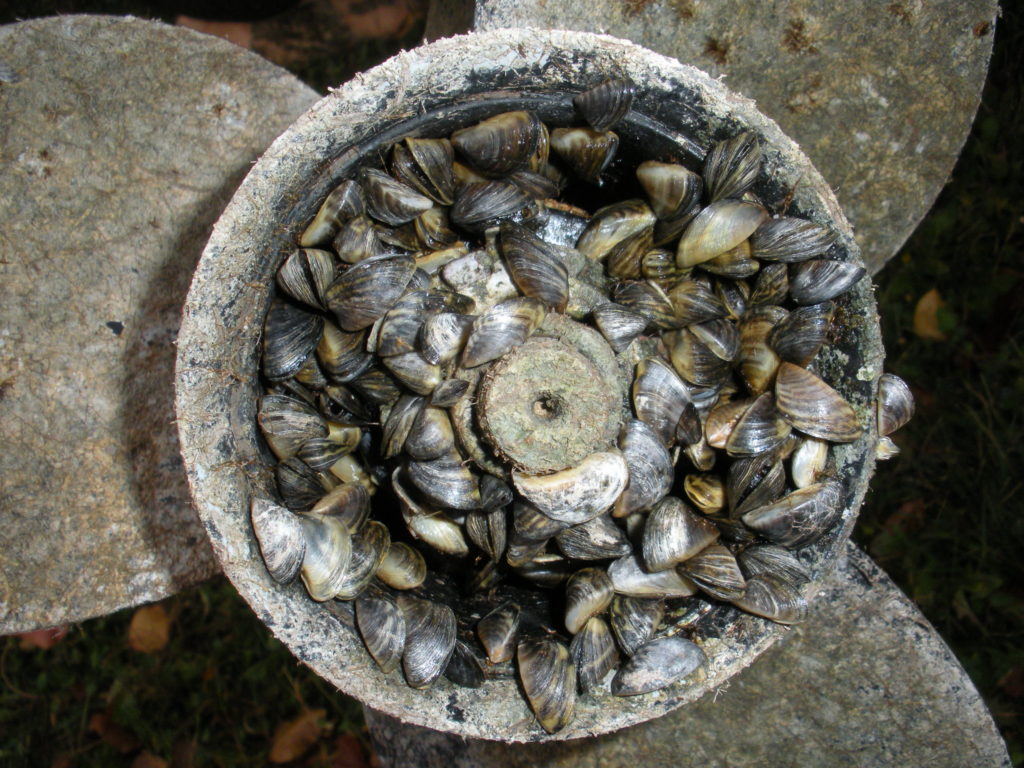
They are also quite capable of strip-mining a waterbody of phytoplankton, the very base of the aquatic food chain. In the Great Lakes, phytoplankton populations have been recorded to drop up to and over 90 percent. Subsequently, zooplankton populations crash as well, leaving many small fishes without their forage base. Unsurprisingly, the Great Lakes have also recorded crashes in baitfish populations…with effects continuing up the food chain.
How are marimo moss balls involved?
It’s unclear at the moment how zebra mussels could find their way into marimo balls, and subsequently the pet trade.
Marimo balls are found in both Europe and Japan. In fact Aegagropila linnaei is considered a cosmopolitan species, known from at least 283 locations in freshwater and brackish environments, with its distribution related to glacial events. It is considered to be in decline, even endangered in some populations. Well-known populations and those which are threatened are often protected.
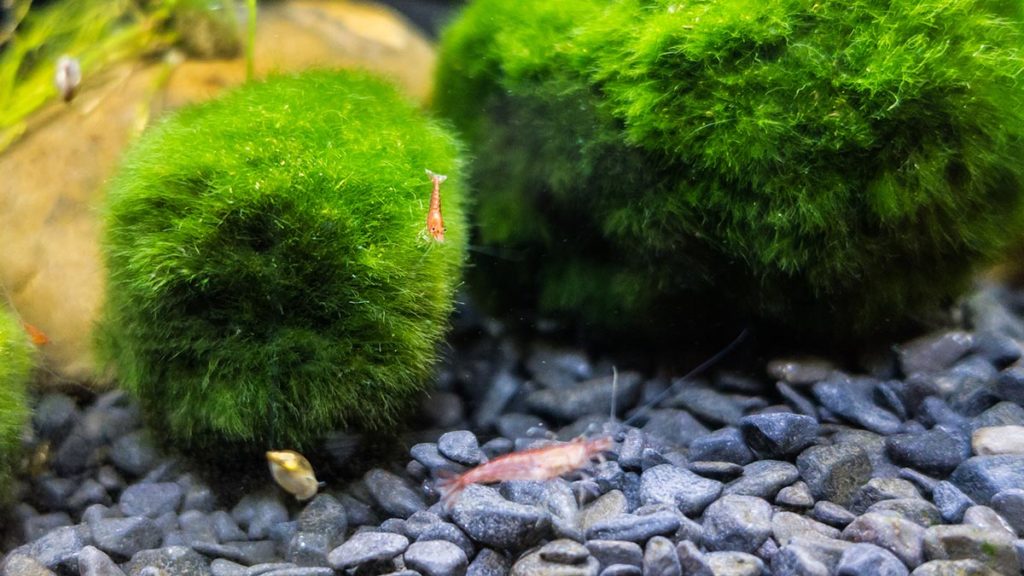
While some online sources suggest that the marimo balls seen in the aquarium trade may in fact be cultured, their rumored slow growth rates may suggest otherwise. Research conducted by Christian Boedeker, Anja Eggert, Anne Immers, and Erik Smets, published in the journal Bioscience in 2010 found that “Lake Svityaz, or the Shatsk lakes, in northwestern Ukraine” was the only wild source that was willing to be divulged during aquarium-trade interviews. From there it was suggested that many balls were being grown out from fragments of those wild balls, both in the Ukraine or even being shipped to Southeast Asia to be cultured and then returned to the European market. The fact that marimo balls in the aquarium trade may likely trace their origins back to a single lake or a small handful of lakes in the Ukraine could be a clue as to how they got tangled up with zebra mussels.
It could be that zebra mussels and marimo balls are naturally occurring together in a particular lake where they have been recently harvested from, which is no surprise given that the native distribution of zebra mussels is considered to be Russian and Ukraine. Even if the mussels weren’t native to the particular lakes that aquarium trade marimo balls originate from, they could have even been introduced to the lakes through human activity, not unlike numerous inland waterbodies here in the United States.
In an update from the Montana Fish, Wildlife and Parks department (MFWP), it was revealed that “It appears these moss balls were imported from Ukraine to a distributor in California and were shipped to pet stores nationwide.” Both live and dead zebra mussels have been discovered, according to the MFWP.
What’s the Risk?
While it seems unlikely that zebra mussels accidentally distributed by the aquarium trade would directly result in new infestations of local waterbodies, it’s definitely a concern we should not ignore.
Should someone’s aquarium become infested, something as benign as a routine water change could put zebra mussel larvae (veligers) into the local sewage system. They could become established in the sewage system itself, or head along to the sewage plant. If larval zebra mussels make it through the sewage treatment processes, there’s no telling where they wind up next (well…wherever that treated sewage goes!).
Best not to risk it: check your marimo moss balls and the aquariums that contain them for zebra mussels. Report any findings to your local department of natural resources.
Further Reading and References
US Fish and Wildlife Service response to zebra mussels in marimo balls: Destroy, Don’t Dump!
KTVZ – Invasive zebra mussels found in aquarium item sold at pet stores, ODFW says
The Telegraph confirms zebra mussel infested marimo balls in Georgia.
Invasive zebra mussels found in moss balls from Wyoming pet stores
Invasive Zebra Mussel Found In Pet Stores Across Wyoming
Pennsylvania Fish and Boat Commission confirms contaminated moss balls at a pet store in the state.
Zebra mussels via the Minnesota Department of Natural Resources
Dreissena polymorpha on the USGS Nonindigenous Aquatic Species website
Aegagropila linnaei on AlgaeBase.org
Global Decline of and Threats to Aegagropila linnaei, with Special Reference to the Lake Ball Habit






Trackbacks/Pingbacks